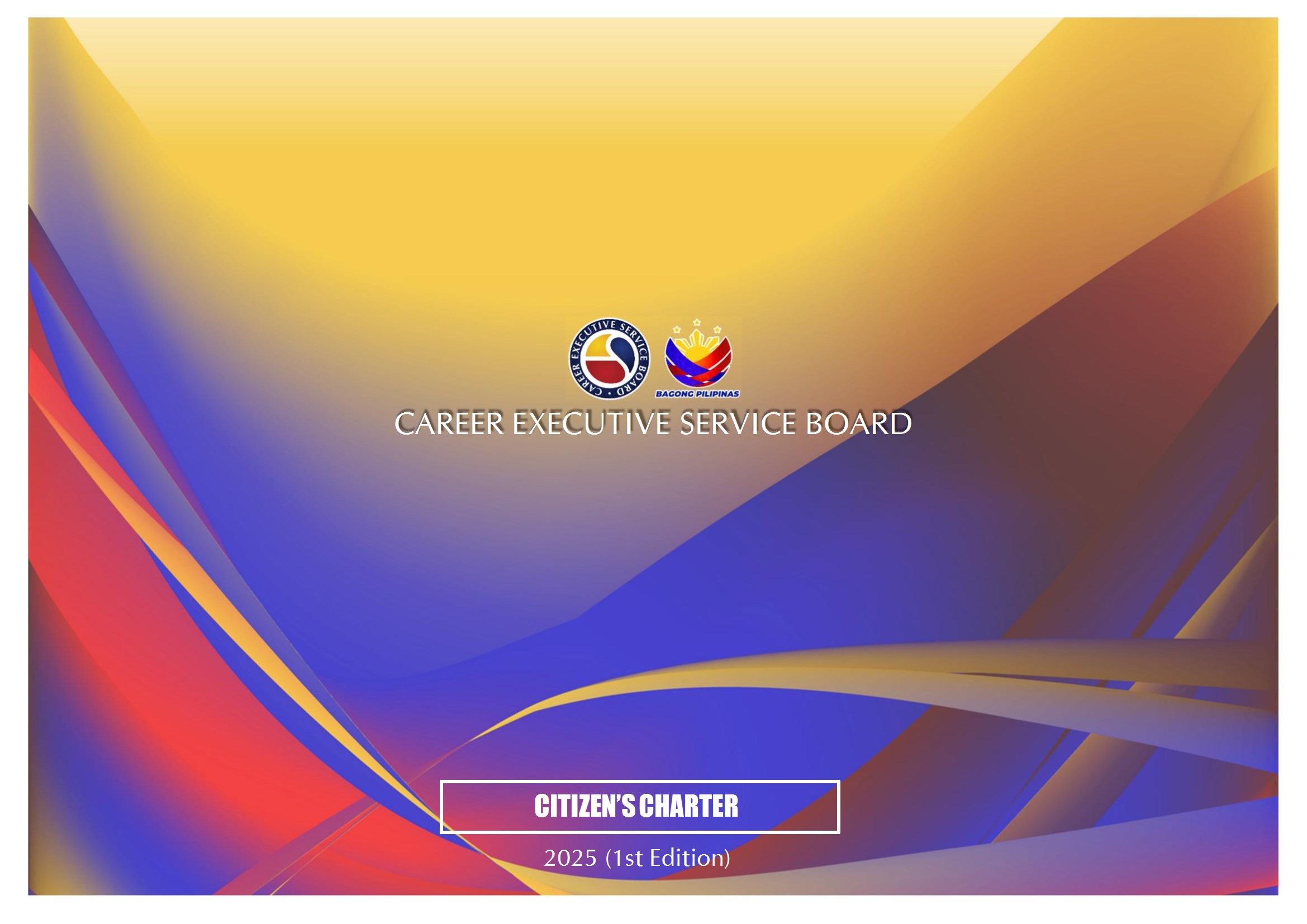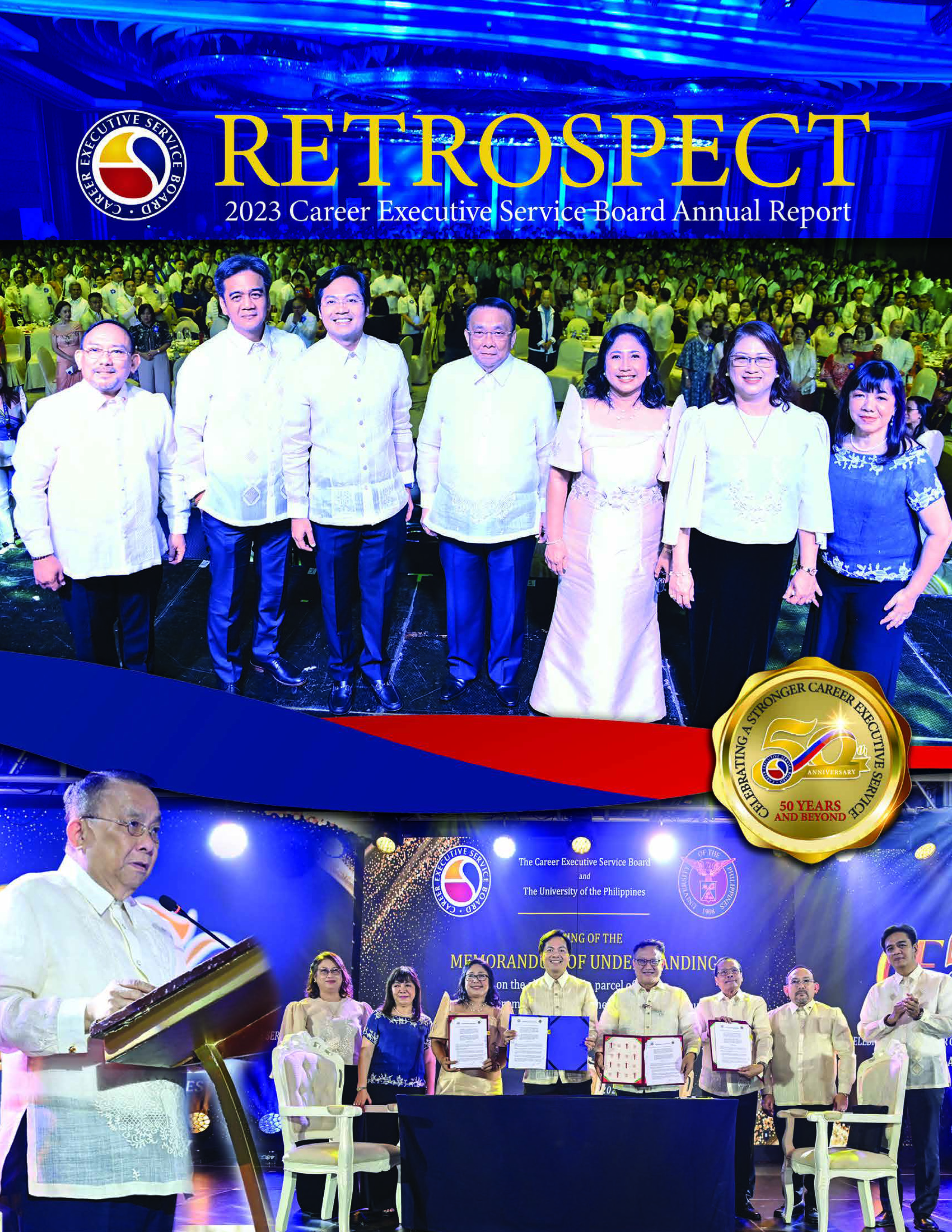THE FOUR-STAGE CAREER EXECUTIVE SERVICE (CES) ELIGIBILITY EXAMINATION PROCESS
Presidential Decree No. 1 dated September 24, 1972 created the Career Executive Service Board (CESB) to serve as the governing body of the Career Executive Service (CES) and to promulgate rules, standards and procedures on the selection, classification, compensation and career development of members of the CES.
Likewise, Section 8, Paragraph 1(c) and 2, Chapter 2, Book V of Executive Order No. 292 expressly provides that the “third level shall cover positions in the Career Executive Service” and that “entrance to the third level shall be prescribed by the Career Executive Service Board.”
As part of the Career Service, entry to the Career Executive Service is based on merit and fitness as determined by competitive examination, or based on highly technical qualifications.
On December 15, 1989, the CES Board issued Circular No. 1 which provides for a four-stage CESeligibility examination process,namely: Management Aptitude Test Battery (MATB); the Assessment Center; the Performance Validation On-the-job; and the Board Interview. In 2009, the Board, through CESB Resolution No. 791 adopted the Revised Integrated Rules on the Grant of Career Executive Service (CES) Eligibility, as amended by CESB Resolution No. 1354. Pursuant to the said rules, CES eligibility examination process consists of the following stages:
- CES Written Examination;
- Accreditation of MNSA or MPSA
- Assessment Center;
- Performance Validation; and
- Board Interview.
CES Eligibility is acquired by passing the four-stage CES eligibility examination process. Successful completion of each stage is a pre-requisite to the succeeding stages of the CES eligibility examination process.
The Career Service Executive Eligibility (CSEE) conferred by the Civil Service Commission (CSC), which consist of two (2) phases, namely: Written Examination and Panel Interview, of one who is appointed to a CES position, regardless of the appointing authority or one who is occupying a Division Chief position in a permanent capacity or one designated to a CES position in an acting or OIC capacity for at least one (1) year, shall be considered equivalent to the two (2) of the four-stage CES eligibility examination process, namely: Written Examination and Board Interview.
Hence, for purposes of conferment of CES eligibility and appointment to appropriate rank in the CES, as the case may be, the applicant concerned has to complete the two (2) remaining stages of the examination process, namely: Assessment Center and Performance Validation stages and comply with such other requirements as may be prescribed by the Board.
CES WRITTEN EXAMINATION
The CES-Written Examination (CES-WE), formerly called the Management Aptitude Test Battery (MATB) is the first of the four-stage CES Eligibility Examination Process.It is a paper-and-pencil type of test that determines the applicant’s general intelligence and knowledge of management concepts and principles. Currently, the CES-WE is composed of 220 test items with seven (7) sub-tests, as follows: Error Recognition, Reading Comprehension, Data Interpretation, Logical Reasoning, Information, Management Concepts and Problems and Essay.The test is administered for 2 hours and 55 minutes.
Applications are open to Filipino citizen of good moral character and meets the following requirements:
- Government Sector, Career Service:
- Appointed or designated in an acting capacity or Officer-in-Charge (OIC) of CES position for at least six (6) months; or
- Appointed or designated to a position with a corresponding salary of 18 or higher that requires performance of managerial and supervisory functions for at least two (2) years;
- Government Sector, Non-Career Service:
- Currently appointed, under a contractual status or coterminous status, to a non-career government position that is higher than a Division Chief; and
- Has at least three (3) years managerial experience.
- Private Sector
- A person of outstanding qualification who are either a proprietor or an incumbent of a position performing managerial/supervisory function for at least three (3) years.
Managerial/supervisory functions pertain, but are not limited to, directing and approving the work outputs of concerned employees; delegating functions to the staff; monitoring and rating employees’ performance based on the duly approved performance targets/plans; and supervising the unit or section/division based on the staffing pattern or organizational structure.
The applicant should meet the cut-off score to proceed to the succeeding stages of the CES Eligibility Examination Process. Applicants who fail to meet the cut-off score may be allowed to retake the test only after six (6) months reckoned from the date of his/her last examination.
The CES-WE results are officially released within sixty (60) days from the date of the examination through the CESB website. An applicant shall likewise be issued with a notice of rating indicating his/her transmuted score.
CES-WE CHEKLIST OF DOCUMENTARY REQUIREMENTS
The following shall be submitted upon filing:
- Duly Accomplished CES-WE Application Form;
- Copy of appointment paper to present position authenticated by the office personnel / administrative officer;
- Service record authenticated by the office personnel/administrative officer;
- Copy of the designation order duly authenticated by the office personnel/administrative officer in case the applicant is presently designated in an acting capacity or officer-in-charge of a CES position for at least six (6) months;
- Organization Chart showing the applicant’s place in the organization and duly certified by the Office Personnel/Administrative Officer;
- Three (3) identical photographs, (size 2” x 2”) with full name tag that includes the surname, first name and middle initial taken not more than six (6) months before the filing of the application.Only two (2) of the three (3) 2” x 2” photographs shall be submitted upon filing of the application. The applicant shall keep the third 2” x 2” photograph and shall bring the same on the day of the examination for posting in the examinee seat plan.Pictures that are scanned, photocopied or computer-enhanced will not be accepted;
- Admission fee of ONE THOUSAND PESOS (P1,000.00) either in CASH or in POSTAL MONEY ORDER payable to the CAREER EXECUTIVE SERVICE BOARD. PERSONAL CHECKS WILL NOT BE ACCEPTED;
- Photocopy of a valid Identification Card (ID) containing the applicant’s picture, signature, birth date and signed by the Authorized Official; and
- Self-stamped envelope with complete mailing address,
REMINDERS IN TAKING THE CES-WE
- Bring the following on examination day:
- Application Receipt
- Valid office Identification (ID) card
- Mongol Pencil No. 2
- Ruler
- One 2x2 ID picture
- Calculator (calculators from cellular phones, personal digital assistants (PDA) and similar gadgets shall not be allowed)
- Applicants are required to be at the examination venue by 7:00 am.
- You may bring food and drinks during the examination but make sure not to disturb the other examinees while eating or drinking.
- Cellular phones should be turned off or switched to silent mode. You will only be allowed to use them during the break.
In observance of the health protocols in view of the COVID-19 Pandemic, examinees are requested to bring their negative RTPCR Test, facemask, face shield, and alcohol/hand sanitizer.
DOWNLOADABLE FORM
CES Written Exam Application Form (see attached)
In 2008, CESB restored the accreditation of the Master in National Security Administration (MNSA) and the Master in Public Safety Administration (MPSA) degrees conferred by the National Defense College of the Philippines (NDCP) and the Philippine Public Safety College (PPSC), respectively, as equivalent to the CES-WE.
The MNSA degree conferred by NDCP and MPSA degree conferred by PPSC shall be accredited as equivalent to the CES-WE provided that the holder thereof is:
An appointee to at least a Division Chief level position (SG 24) or its equivalent in the government, regardless of whether he/she is in the career or non-career service with at least three (3) years managerial experience at the time of the application.
MNSA/MPSA ACCREDITATION CHEKLIST OF REQUIREMENTS
The following shall be submitted upon filing:
- Written Application Letter to the Board requesting accreditation of his/her MNSA/MPSA degree as equivalent to the CES-WE;
- Copy of the MNSA/MPSA diploma duly certified by an official of the NDCP/PPSC;
- Copy of appointment paper to present position duly authenticated by the Personnel/Administrative Officer;
- One 2”X2” photograph taken not more than six months before the filing of the application;
- A certification issued by the Personnel/ Administrative Officer that the applicant has been performing supervisory/managerial functions and managing a number of staff for a number of years;
- Notarized self-certification that he/she has not been dismissed from service for cause or found guilty by final judgment of a crime involving moral turpitude or other offenses;
- Updated personal data sheet (CS Form 212); and
- Accreditation Fee of P1,000.00
ASSESSMENT CENTER
The Assessment Center (AC), the second stage of the CES eligibility examination process, is a series of simulation exercises involving work-based situations, designed to measure whether the applicant has the capacity to advance to managerial duties and responsibilities and determine his/her ability to grow and develop in the organization.
These exercises allow candidates to elicit and demonstrate managerial competencies, key behaviors and significant performance dimensions/indicators essential in the organization.
A typical AC is composed of four (4) centers, consisting of six (6) Assessees who are observed by three (3) Assessors per center. It is a whole day exam that runs from 7:00 am to 6:00 pm.
The list of AC Passers is officially released within sixty (60) days from the date of the AC through the CESB website. Assessees are provided with their AC result indicating their performance in each AC competency/dimension.
AC ADMISSION PREREQUSITES
The AC applicant should be a/an:
- AC re-taker;
- CES-WE passer;
- Career Service Executive Eligible (CSEE); and
- MNSA/MPSA degree holder whose request for accreditation has been approved by CESB.
AC CHEKLIST OF DOCUMENTARY REQUIREMENTS
For first-time AC applicants:
- Duly accomplished AC Application Form (QF008-00)
For Career Service Executive Eligibles (CSEEs):
- Duly accomplished AC Application Form (QF008-00);
- Latest Appointment Paper authenticated by the office personnel / administrative officer;
- Service Record authenticated by the office personnel/administrative officer;
- Copy of the designation order duly authenticated by the office personnel/administrative officer indicating that applicant is designated to a third level position; and
- Certificate of CSE Eligibility issued by the Civil Service Commission
For AC Re-takers and MNSA/MPSA degree holders:
- Duly accomplished AC Application Form (QF008-00);
- Latest Appointment Paper authenticated by the office personnel / administrative officer;
- Service Record authenticated by the office personnel/administrative officer;
- Copy of the designation order duly authenticated by the office personnel/administrative officer indicating that applicant is designated to a third level position
REMINDERS IN TAKING THE AC
- Applicants are required to confirm their participation by sending the accomplished Assessment Center (AC) Confirmation Slip and pay the AC fee on the prescribed deadline.
Failure to do so shall constrain CESB to forfeit the applicant’s slot and make it available to those in the waitlist. Failure to attend or complete the AC will mean forfeiture of your AC Fee.
- On the examination day, assesses are expected to be at the CESB Office at exactly 7:00 am and are required to bring the following:
- Valid Office Identification Card;
- Two (2) pieces of 2 x 2 recent I.D. picture;
- Ballpen; and
- Php 700.00 for lunch and snacks
- Bringing of bottled water, candies additional ballpen and pencil is highly encouraged.
VALIDATION OF ON-THE-JOB PERFORMANCE
Validation, which is the third of the four-stage CES eligibility examination system, is the process that facilitates a detailed inquiry, examination and verification of the candidate’s on-the-job performance, managerial/behavioral competence and integrity.
The investigation is done by a CESB-certified validator through feedback-gathering mechanisms, such as interviews of resource persons, public officials/employees and non-government sector representatives who have worked with the candidate and who may have knowledge of the candidate’s fitness to be conferred CES eligibility.
Validation is conducted to ensure that the candidate’s performance in the previous stages of the examination is also demonstrated in the workplace. There may be some candidates who appear to be competent based on written tests but may not be so in their actual jobs. Thus, validation of their on-the-job performance becomes relevant and essential.
The validation system focuses on three (3) dimensions:
- Performance which is the ability of the candidate to deliver results and contribute to the agency’s goals and identified outcomes;
- Managerial/Behavioral Competence which assesses the effectiveness of the candidate as a manager and leader; and
- Integrity which focuses on how the candidate demonstrates honesty, accountability, fairness and objectivity.
It shall be assessed based on three (3) sources:
- Clearances from the Civil Service Commission (CSC), Office of the Ombudsman and Sandiganbayan;
- Feedback from the public through publication of candidate’s name in a newspaper of general circulation; and
- Information from identified respondents.
The validation system is two-pronged: Level 1 which is the Rapid Validation Process (RVP) and Level 2, the In-Depth Validation Process (IVP). The RVP which is conducted and completed in one (1) day covers all qualified applicants who do not have any adverse feedback on performance, managerial/behavioral competencies and integrity.
On the other hand, the IVP is a focused, more intensive and longer validation depending on the nature, extent and gravity of adverse feedback or information on the applicant.
Result of the candidate’s validation will depend on any of the following recommendations by the validator:
- Undergo IVP when RVP generates adverse information/feedback;
- Proceed to the Next Stage of the Eligibility Process;
- Defer conduct of Performance Validation for a period of six (6) months to one (1) year; or
- Undergo revalidation if the candidate fails to meet standards set by the Board after the conduct of IVP. Moreover, a candidate who is subjected to revalidation shall be given appropriate feedback and shall be advised to engage on developmental interventions.
It is also noted that in case the Secretariat receives adverse feedback about a candidate as a result of publication, the candidate is automatically subjected to IVP.
VALIDATION CHEKLIST OF REQUIREMENTS
For the Performance Validation Stage the candidate is required to accomplish and submit two (2) copies of the following:
- Personal Data Form;
- Candidates’ Profile;
- Organizational chart showing your place in the organization;
- List of immediate superior/s and subordinates as certified by your Personnel Officer/HRMO;
- Recent appointment paper and service record; Detailed information about the pending case/s, if any;
- Recent performance rating certified by agency personnel;
- Recent sworn Statement of Assets and Liabilities, and Net Worth, Disclosure of Business Interests and Financial Connections and Identifications of Relatives in the Government Service;
- Recent Employer’s Certificate of Compensation Payment/Tax Withheld (BIR Form No. 2316). Should you have other business interest other than your employment in the government, kindly submit also the recent Annual Income Tax Return for Self-employed (BIR Form No. 1701).
- Php 800.00 validation fee to cover for publication and clearance fees.
PANEL INTERVIEW
The Panel Interview is the last stage of the Career Executive Service (CES) Eligibility Process.
It is composed of a three-man panel conducted to determine and assess the applicant’s confidence, creativity, self worth and outlook on his/her work and the organization.
Managerial capabilities and potentials, leadership qualities, office accomplishments and performance as well as the applicant’s integrity are discussed during the interview.
The interview is also an opportunity for the interviewers to give feedback on the applicant’s performance on the three (3) previous stages he/she underwent.
The panel of interviewers are primarily tasked to deliberate and decide on whether the applicant is recommended to be:
- Conferred CES Eligibility;
- To defer conferment of eligibility; or to be
- Denied conferment based on existing policies of the Board.
Applicants will be officially informed of their interview schedule which is conducted at the CESB Office.
CONFERMENT OF CES ELIGIBILITY
A CES Eligibility shall be conferred to a candidate who is able to successfully complete the four-stage CES Eligibility Examination Process and meet other requirements as may be prescribed by the Board.
It shall be conferred by the Board through a resolution approved by the majority of its members in a regular or special meeting.
Upon approval of the resolution, the applicant is considered a full-fledged CES eligible and his/her name shall be registered in the Board's Roster of CES eligibles and a corresponding certificate of CES eligibility shall be issued in testimony of his/her newly acquired qualification.
CONFERMENT OF CES ELIGIBILITY CHEKLIST OF REQUIREMENTS
For candidates to be conferred CES eligibility, they should also be able to comply with the other requirements prescribed by the Board such as:
- Performance rating of at least Very Satisfactory for the immediately preceding year; and
- Clearances from the CSC, Office of the Ombudsman and Sandiganbayan.
 Home
Home
 The "Taas Noo, CESO" campaign is a movement within the Career Executive Service (CES) that seeks to strengthen current...Read more...
The "Taas Noo, CESO" campaign is a movement within the Career Executive Service (CES) that seeks to strengthen current...Read more...
 The "Taas Noo, CESO" campaign is a movement within the Career Executive Service (CES) that seeks to strengthen current...Read more...
The "Taas Noo, CESO" campaign is a movement within the Career Executive Service (CES) that seeks to strengthen current...Read more...



 The "Taas Noo, CESO" campaign is a movement within the Career Executive Service (CES) that seeks to strengthen current...Read more...
The "Taas Noo, CESO" campaign is a movement within the Career Executive Service (CES) that seeks to strengthen current...Read more...
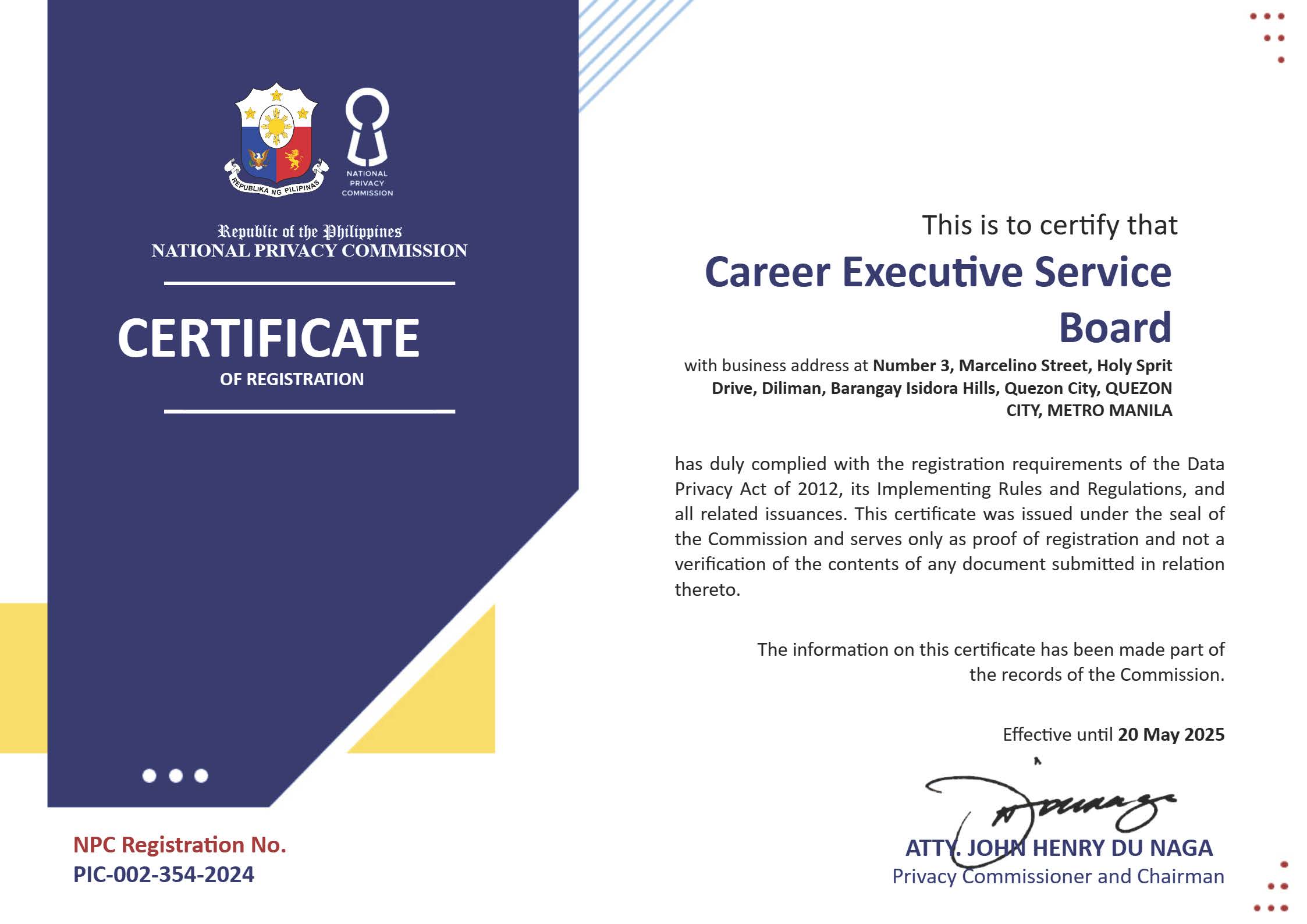
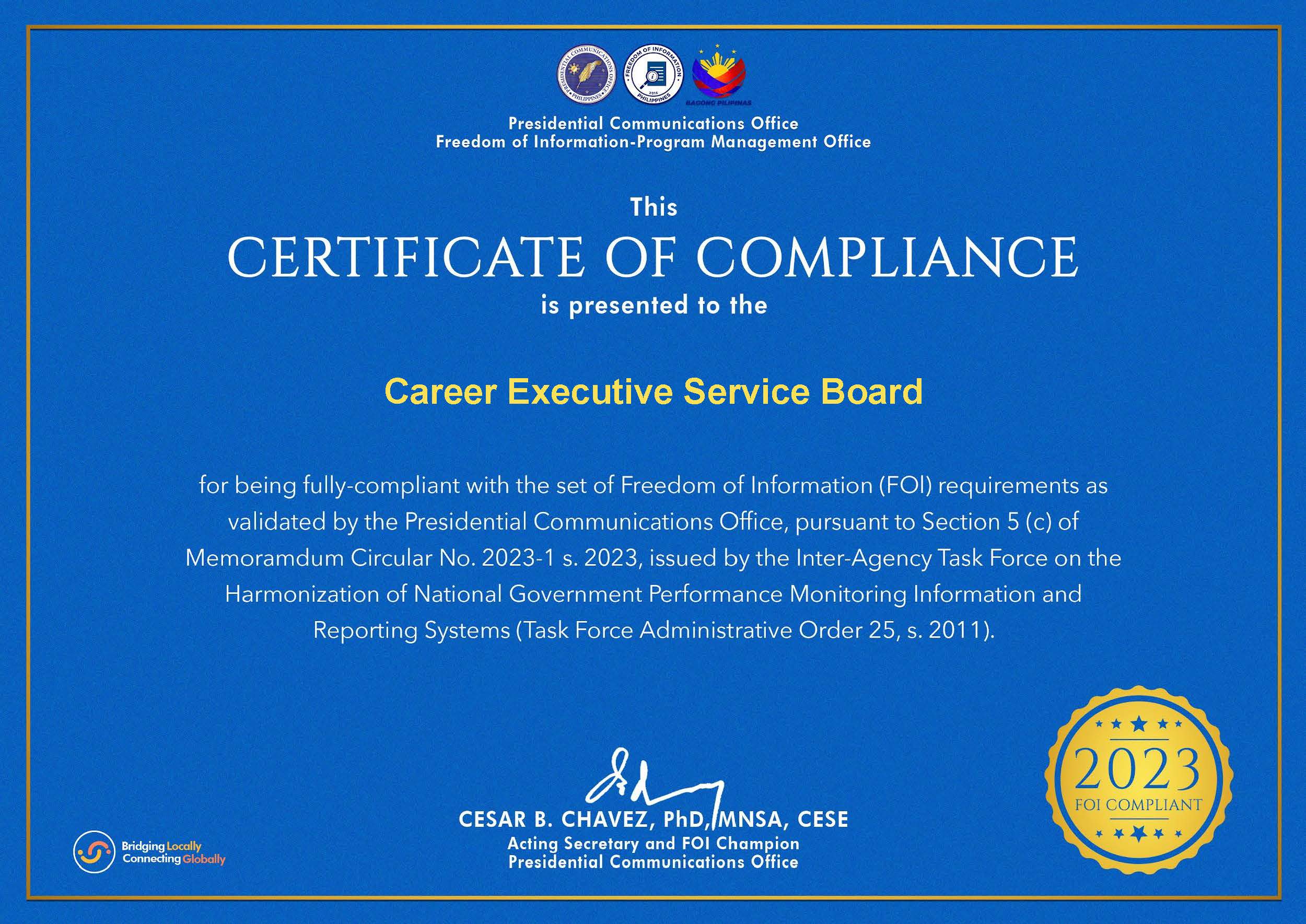
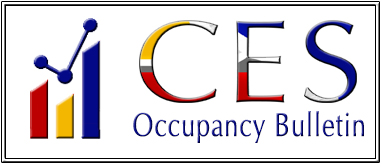

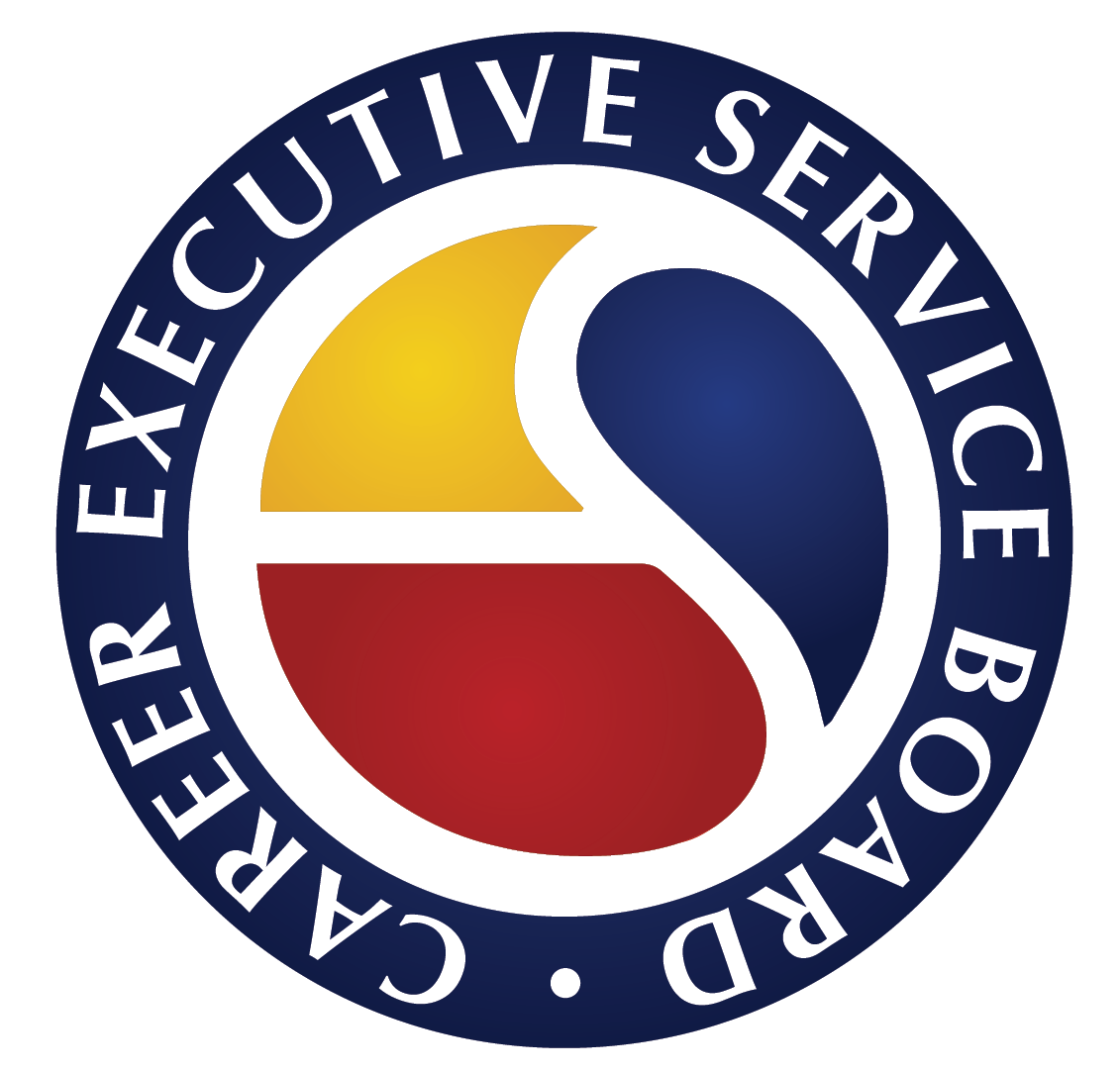 CESB Learning and Development Programs Calendar for 2025
CESB Learning and Development Programs Calendar for 2025 Trainings Offered by the Development Academy of the Philippines
Trainings Offered by the Development Academy of the Philippines